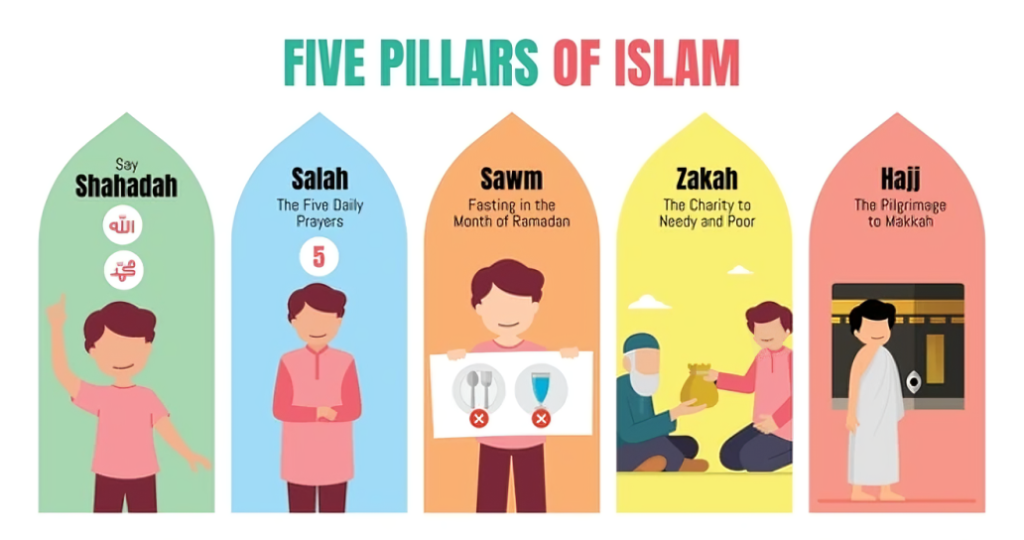Islam is founded on five fundamental practices, known as the Five Pillars of Islam. These pillars represent the core beliefs and practices that shape a Muslim’s faith and actions.
The five pillars of Islam are Shahada, Salah, Zakat, Sawm, and Hajj.
They guide the way Muslims live their lives, interact with others, and worship Allah. Understanding these pillars is essential for anyone seeking to grasp the essence of Islam.
In this guide, we’ll explore each of the Five Pillars in detail, providing insights into their significance and practices.
Enhance your understanding of Islam with our Basic Islamic Studies Course. Register now to claim your one-week free trial!

1. First Pillar of Islam: Shahada (Declaration of Faith)
What is Shahada?
Shahada is the Islamic declaration of faith, and it’s the most fundamental of the Five Pillars. It consists of a simple yet profound statement: “There is no God but Allah (SWT), and Muhammad (PBUH) is the Messenger of Allah.” This declaration is not just a verbal affirmation but a profound belief that underscores the monotheistic essence of Islam.
Significance of Shahada
- Foundation of Faith: Shahada affirms the core belief in the oneness of Almighty Allah (SWT) and the prophethood of Muhammad (PBUH). It is the cornerstone of a Muslim’s faith.
- Expression of Commitment: By reciting Shahada, Muslims express their commitment to follow the teachings of Islam and live according to its principles.
Practices Involving Shahada
- Daily Life: Muslims repeat Shahada during daily prayers and at other significant moments.
- Conversion to Islam: Reciting Shahada is the first step for anyone converting to Islam, symbolizing their entry into the faith.
2. Second Pillar of Islam: Salah (Prayer)
What is Salah?
Salah refers to the ritual prayers performed five times a day. These prayers are a direct link between the worshiper and Allah, providing moments of spiritual reflection and connection throughout the day.
Importance of Salah
- Connection with Allah: Salah helps Muslims maintain a close relationship with Allah Almighty, offering a structured way to communicate with Him regularly.
- Discipline and Routine: The fixed times for prayer encourage discipline and help structure a Muslim’s day around their faith.
The Five Daily Prayers
- Fajr: Performed before dawn.
- Dhuhr: Performed after midday.
- Asr: Performed in the afternoon.
- Maghrib: Performed just after sunset.
- Isha: Performed at night.
How to Perform Salah
- Preparation: Perform ablution (wudu) to ensure cleanliness.
- Rituals: Follow a set sequence of movements and recitations during the prayer.
Build a strong foundation for reading the holy Quran with our Noorani Qaida Course. Enroll today!
3. Third Pillar of Islam: Zakat (Almsgiving)
What is Zakat?
Zakat is a form of almsgiving, one of the pillars of Islam that involves giving a portion of one’s wealth to those in need. It is often seen as both a spiritual purification and a means to promote social justice.
Significance of Zakat
- Purification of Wealth: By giving away a portion of their wealth, Muslims purify their possessions and detach from materialism.
- Social Responsibility: Zakat helps address poverty and inequality, supporting those less fortunate in the community.
How Zakat is Calculated
- Percentage: Muslims are required to give 2.5% of their accumulated wealth annually.
- Eligibility: Zakat is due on certain assets, including savings, investments, and other forms of wealth.
4. Fourth Pillar of Islam: Sawm (Fasting during Ramadan)
What is Sawm?
Sawm refers to fasting during the holy month of Ramadan. Muslims abstain from food, drink, smoking, and marital relations from dawn until sunset during this month.
Purpose of Sawm
- Spiritual Reflection: Fasting helps Muslims develop self-discipline and empathy for the less fortunate.
- Increased Devotion: Ramadan is a time for increased worship, prayer, and reading of the Quran.
Exemptions and Exceptions
- Health Issues: Those who are ill, pregnant, nursing, or traveling are exempt from fasting but must make up the missed days later.
- Children and Elderly: Children before puberty and elderly individuals are not required to fast.
Enhance your Quranic reading skills with our online Quran Reading Course. Sign up now for a free trial!
5. Fifth Pillar of Islam: Hajj (Pilgrimage to Mecca)
What is Hajj?
Hajj is the pilgrimage to the holy city of Mecca, which every Muslim who is physically and financially able must undertake at least once in their lifetime. It is performed annually during the Islamic month of Dhu al-Hijjah.
Significance of Hajj
- Unity of Muslims: Hajj represents the unity of Muslims from all over the world, demonstrating equality before Allah.
- Spiritual Renewal: The pilgrimage offers an opportunity for spiritual reflection, forgiveness, and renewal of faith.
Rituals of Hajj
- Ihram: Entering a state of spiritual purity and wearing special white garments.
- Tawaf: Circling the Kaaba seven times in a counterclockwise direction.
- Sa’i: Walking seven times between the hills of Safa and Marwah.
- Standing at Arafat: Spending the afternoon in prayer and reflection at the Plain of Arafat.
- Ramy al-Jamarat: Throwing pebbles at three pillars representing Satan.
Conclusion: The Five Pillars of Islam
The Five Pillars of Islam form the foundation of a Muslim’s faith and practice. Each pillar plays a crucial role in shaping a Muslim’s spiritual, social, and ethical life.
From the declaration of faith to the pilgrimage to Mecca, these pillars guide Muslims in their worship, personal conduct, and interactions with others. Embracing these pillars helps Muslims to live a balanced, fulfilling, and devout life.
Commit to memorizing the Holy Quran with our Quran Memorization Course. Join today!
FAQs
1. What is the significance of Shahada in Islam?
Shahada is the declaration of faith and is considered the most fundamental pillar of Islam. It affirms the belief in the oneness of Allah Almighty (SWT) and the prophethood of Muhammad (PBUH), laying the foundation for a Muslim’s faith.
2. How often do Muslims pray, and what are the times for Salah?
Muslims pray five times a day: Fajr (before dawn), Dhuhr (after midday), Asr (in the afternoon), Maghrib (just after sunset), and Isha (at night).
3. What is the purpose of Zakat, and how much should be given?
Zakat is a form of almsgiving intended to purify wealth and support those in need. Muslims are required to give 2.5% of their accumulated wealth annually as Zakat.
4. Who is exempt from fasting during Ramadan?
Individuals who are ill, pregnant, nursing, or traveling are exempt from fasting but must make up the missed days later. Children and the elderly are also not required to fast.
5. What are the key rituals of Hajj?
The key rituals of Hajj include Ihram (wearing special garments), Tawaf (circling the Kaaba), Sa’i (walking between Safa and Marwah), standing at Arafat, and Ramy al-Jamarat (throwing pebbles).

